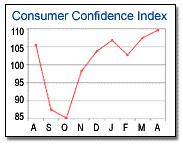Economy: USA: Strong consumer confidence is edged by rising oil prices as inflationary leader-trend
.
As recently as April 25, a prestigious economic business agency, the Conference Board, issued an analysis of US economic tends from the indecial standpoint of "consumer confidence." The results reported at the time, not so long ago, are extraordinary:
Consumers shrugged off higher gasoline prices in April and sent a widely watched barometer of consumer confidence to its highest level in almost four years, a private research group said Tuesday.

Consumer Confidence Index,Aug2k5-Apr2k6
Conference Board NY,
But the New York-based Conference Board warned that if fuel prices continue to rise, it would cast a pall on consumer spending, which accounts for two-thirds of all U.S. economic activity.The report is by Anne D'Innocenzio, the well-known economics reporter for Associated Press, and I found it in Business Week who bases her coverage on the Consumer Confidence Index of CB, as reported on CB's site by CB staff member, Lynn Franco. So, these two sources are those to watch on this crucial USA economic indicator: Anne D'Inncenzio and Lynn Franco. What's more, a similiar index is maintained in Canada by the Conference Board of Canada, but to access it costs an arm and a leg, so it is restricted to business and the very rich. This arrangement of sequestering consumer and business attitudes indeces for insiders is a metaphor for the contempt Canadian business shows towards consumers (not absent in the USA, but counterbalanced decisi
The Conference Board said that its consumer confidence index rose to 109.6, up from a revised 107.5 in March. April's reading was the highest since the index touched 110.3 in May 2002. Analysts had expected a reading of 106.4.
Neverthless, I think for now we can generlize that consumer confidence is h+ in both USA and Canada, but extraordinarly so USA. We can't say it's so in "North America" because officially that includes Mexico, where we're totally in the dark about consumer confidence, except for the floodtide of illegals crossing the border in to USA. (But that's another story.)
What's singular about the USA h+ on the index is that it achieved its stellar rank despite the rising oil prices, the unpopularity of the President whose economy-craft brawt about the present health of the system not least by means of tax-cuts, including those for investors. Another factor that would work against h+ consumer confidence, one mite assume, would be the string of disasters that have hit the infrastructure in the last year - as in the case of Katrina's devestation of braod stretches of American South. Especially the city of New Orleans. Recovery and re-bulding certainly works in favour of positive economic trends, but whould it contribute to the rising of the specific consumer confidence? Whether so or no, that index is up to an amazing degree. Even discontent over the war against terrorism and skyrocketing national security expenditures at home (which does translate into more jobs), does not so far deflate or level out consumer confidence. America's consumers are buying or planning to buy in the next several months the goods and services that typify a growth economy. That trend leaves unanswered the critique of growth as an economic norm (Goudzwaard and other Christian economists), but that fact entails to large a discussion to engage with here. - Owlb


No comments:
Post a Comment